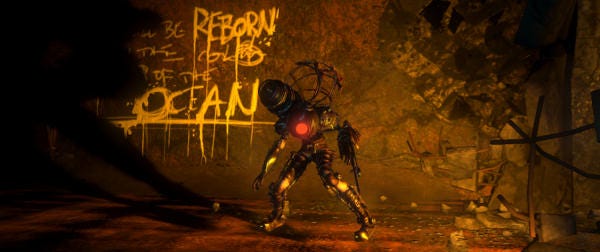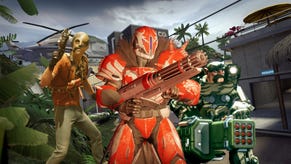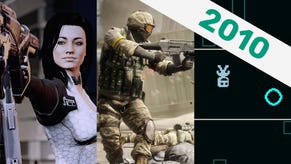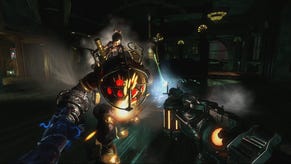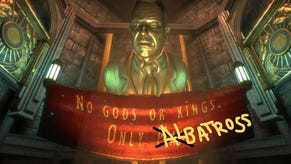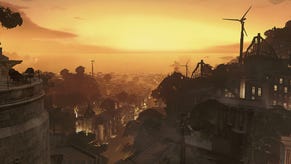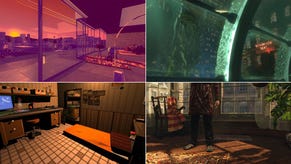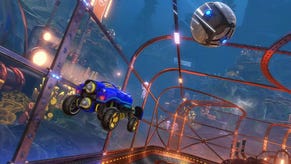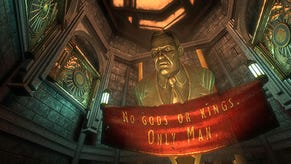Wot I Think: Bioshock 2
The DRM sucks. It really does. Only... I can't comment on exactly how sucky it is because this an opinion based on the 360 version of the game. I know! I played it on a gamepad and everything! I'll be handing in my PC4EVA badge and gun momentarily, but before that it seemed wise to at least write up my experiences. 360 is what we had access to for review, and, while largely speaking (based upon the differences between BS1 console and PC, and how technically similar this is to BS1) the experience should be very similar, I can't say that it definitely will be, or that those multiple forms of copy protection won't cause every PC in the world to turn into a chocolate muffin with chicken nuggets on top when it unlocks tomorrow. That would make me a liar, and I only lie about things that don't matter, like loving my family and whether I really finished reading that Stephen Hawking book. I'll be checking BS2 PC out tomorrow, and if there's any sign of trouble or disparity with anything in this piece, rest assured there'll be posts about it. For now, though: An Opinion.
I've got a PC copy of it here, which I can't currently play due to the stupid, paranoid unlock thing not happening til tomorrow, but I'll be firing it up and double-checking all matches up with these thoughts as soon as it does. Promise. And I'm not crossing my fingers, look:
You have no idea how difficult it was to arrange that photo, as obviously I didn't have a hand free to take it with. Ended up with my camera phone balanced on the back of a chair, trying to hit the shutter button with my nose. I had to... oh yeah, Bioshock 2.
Where to start? In a way, RPS is the worst possible place to be writing about Bioshock 2. You proud, loyal PCites are so steeped in gaming history, having experienced the best and brightest of brainy shooters - Deus Ex, System Shock, Stalker, X-COM: Enforcer, Vampire Bloodlines... Poor Bioshock tried - and failed - to break into a very exclusive clique. It found its own ways to be interesting (and its own ways to make a right old mess of a few things), but it was much closer to a traditional shooter than its perceived siblings. It's a shame it didn't do some of the things they did, but that was its developers' decision. So: stop comparing it to them. Compare it to its direct contemporaries instead. On 360, it found much more acceptance for a reason: most 360 owners only had the likes of Halo and Gears of War to compare it to. Glossy, but unambitious.
When I reviewed Bioshock 2 for IGN - which I sort of wish Kieron hadn't already linked to in the Sunday Papers, as I was consciously writing for a very different audience - the question "would I rather these readers play this, or Modern Warfare 2?" was in my head at all times. Clearly, I'd rather they played this. On PC... well, it's not that easy, as we're spoiled for excellent choice, historically at least. Maybe it should be that easy, though. Bioshock 2 is, lest it were not obvious, more of the same. Now, I have some real problems with that, which I'll get into shortly, but nothing is achieved by holding it against Shock 2 et al now - this is the path these games have chosen. Let's accept that decision, and see where it leads to instead of forever thinking of the road not taken.
To start with the good: the combat's so much better. I'll come back to why later, but I just wanted to state up front, before I have a big old whinge, that it's a really solid game in terms of killing nasty people in entertaining ways. Let's go into the less-good now though, as there's some stuff I want to get off my chest. Earlier today, I was idly browsing through the art book that comes with the special edition of the game, and repeatedly I spotted designs that made a boyish thing in my brain exclaim "ooh, that looks ace! I can't wait to play Bioshock 2!" Only... I've already completed Bioshock 2. None of these things were in there - the Big Daddy with arms like tortured tentacles, another which looked like a spaceship on legs, the Splicer whose grotesquely mutated face had become a fleshy whirlpool, a hideous sea-beast halfway between a merman and giant phallus, a frail, frock-wearing Big Sister who carries her hulking oxygen tank around on a rickety hand cart... Where are they? What happened?
I flick through this tome of delights and horrors, and I feel incredibly sad. So little of this apparent cyclone of character design creativity made it in. In multiple cases, there's an annotation from one of the development team reading "in the end, we reused this model or that animation from Bioshock 1...." That's what the game feels like, too. Bar two rather splendid setpiece levels, which are absolutely worth experiencing even if they don't hit as hard as Would You Kindly, it's an incredibly familiar-looking game in both is populace and its environments. Variation, not novelty, is the guiding aesthetic. Obviously, you're back in Rapture so there has to be commonality with the structures and science of the first game, but it's a shame to never be shocked. The Splicers are the same Splicers with an occasional fearsome, hard-to-kill Brute variant salvaging them from cannon fodder status, and while there are new Daddy types, they evoke their predecessors a little too strongly. The Big Sisters? A fine and consistently challenging miniboss, but a conceptual let-down.
Bioshock 2 is, I must stress, a strong first-person shooter: great-looking, varied and often incredibly nasty combat, well-paced escalation and richly-detailed environments. Those new Daddies, especially the turret-placing ones, make a big, challenging difference to the fights, even if they don't do so much for the eyes. At no point does it muster anything anywhere near as striking as that first image of a Big Daddy with his Little Sister, that art we all saw a few years ago and immediately thought "yes". It seems it had once intended to go further - but something went wrong. It's reckless and arrogant to guess at what limitations might be imposed on a publisher-owned studio charged with creating a sequel to a game made by someone else, but difficult not to wonder what might have been if 2K Marin had been given more resources, more time, more freedom. This applies to its story, too - while it's more consistent than Bioshock 1's, more ingrained to the player's journey throughout, it seems unable or unprepared to launch off in new directions.
Instead, it's a lump bolted onto the side of the first game, trying to find holes to fill that don't exist, and crudely intertwining with the original narrative in ways that don't quite convince. In some ways it makes more sense - the main antagonist at least explains their ultimate plan rather than simply turns into a 12-foot blue person and tries to punch you in the nose - in other ways less. There are reasons given as to why you didn't hear anything about Sophia Lamb, the altruism-obsessed rival to Andrew Ryan who's taken control of Rapture in the wake of his golfing accident, during the first game, but it does distractingly feel throughout as though there's been a mandate to expand the Bioshock story without, in fact, continuing it. And Lamb's plans for Rapture, for her daughter Eleanor, and for you - as Eleanor's former Big Daddy - are weighed down with so much babbling pseudo-science that the neatness and horror of the Little Sister concept is almost undone.
Part of Rapture's great wonder was that it was just believable enough, if you squinted your brain a bit (or a lot), but this lathers on so much wild sci-fi that it's that much harder to connect to it. The Sisters are elevated from horrifying genetic/psychological experiment into all-powerful messiah figures capable of pulling any old deus ex machina out of the hat. Making them into so much reduces the power and the sadness of what they are. As a result, the concept feels too exhausted to ever be used again. Though of course it will be.
A big part of the problem is the mystery's gone - we know what Rapture is, we know the condition it's in, and we know what happened to the guys behind it (hint: DEAD IN THE FACE). It would be a tall order to reintroduce any of that, without switching to a different setting entirely (which I wish BS2 had done, and BS3 better bloody well do). So, instead of a journey of discovery, it's a personal journey. Don't expect great revelations in terms of who your character, prototype Big Daddy Subject Delta, really is - he's eyes for you to see through, and that's all that matters. He has a goal, and that's to be reunited with Eleanor. It's far more concrete a purpose than BS1's Jack had for the bulk of the game, which was only ever "find out what the blinking crikey is going on in this watery hell-hole." If the denouement's less satisfying, that's because this is a smaller, more straightforward tale. What twists there are are pretty self-contained to individual characters rather than presenting a major shift in what's going on. In other words: I can't see there being the same flurry of speculation, re-interpretation and even nitpicking that followed BS1. While that lack of advancement for the BS universe might be missed, what we do have is a sensibly compartmentalised, bittersweet tale of one man's quest to be a father figure. It doesn't stretch itself too far, but being wilder (as the art book hints it once might have been) about the physical and social changes Rapture has suffered during the decade of ruin since the events of the first game would have created a welcome balance between the compellingly personal and the memorably melodramatic.
Even the much-ballyhooed Big Sisters are presented without mystery; they're just there. The underwater sections, meanwhile, are at least very similar to trying to walk along the bottom of a swimming pool - the difference being that at least you can play splashies if you get bored in a swimming pool. They're a bit of breathing space between the game lobbing a bundle of angry mutants at you, but entirely pointless otherwise.
'Straightforward' is about as apt a term as you could find for BS2. There are choices to be made about whether you save or slay three key NPCs, which will affect the game's resolution and - forgive me for being vague, but I fear spoilers - some of the sights you'll see towards the game's climax. In the grand scheme of games concerned with shooting people in the face, they're interesting dilemmas with interesting direct and indirect consequences, but in the larger scheme of games concerned with making you question your own actions and believes, they're pretty throwaway. Still, they're essential and themed enough that they elicit sympathy with Delta - a man who's been abused, multilated, nearly murdered and then separated from the one thing he still cares about. Should he be a model of compassion and forgiveness, or should he seek the revenge he's arguably entitled to? Even if the mechanism of your choices is simple, their cause and effect alike are directly relevant to the player character. There's not much to them, but that's how they should be: this is a first-person shooter. It isn't Dragon Age.
What it is - to finally cease the whingeing part and get onto why I really do like this - is a very good first-person shooter, in terms of being a game in which you progress from point A to point B by killing a lot of people. With the interface no longer positing Plasmids as an awkward alternative to weapons, but instead a simultaneous addition, it feels a lot more fluid, a lot crunchier. Whenever you're not using the almighty drill, Subject Delta feels more like Everybloke than a Big Daddy - fast and fragile rather than lumbering and heavily-armoured. It's probably the right decision, going on how full-on Daddyvision feels when you pick up the vaunted suit when it sporadically appears in multiplayer. The slow turning circles and screen-shaking, glacial stomp wouldn't be much fun over 10+ hours, so the alternative - to be relatively nippy and blessed with an explosively escalating skill set - feels right.
It's a much more brutal game than the first, foregoing the sinister subtlety BS1's Splicers demonstrated in favour of massed, respawning waves of the fruity-faced buggers. Even on Normal difficulty, their numbers can present a real problem. Which means it's a more satisfying challenge, another replacement for the lost mystery: it's now about mastering the situation rather than explaining it. While the weapon and Plasmid roster is broadly similar to the tools provided in BS1, everything's noticeably amped up, more destructive, more laced with combo possibilities.
Once you've upgraded a few Plasmids to level 3 and equipped some of the meatier (and much more effective) Gene Tonics, you're into full-on superhero mode. It's a lot of fun, a torrent of gore and death and elemental destruction. Another big part of this is the change in the nature of the environments - not many tunnels, but instead each level is a large playground you'll circle around repeatedly, combing it for goodies, for Little Sisters/ADAM and for audio logs, and also using as huge combat arena. Splicers respawn with relative subtlety, so the fight never quite stops. You'll learn the map, though - where the water puddles that amplify the Electro-Shock plasmid or the oil slicks that make the fire one so deadly are, where you've left trapped security cameras and health machines...
In BS1, it was a matter of noticing or not noticing such things, then moving on. Or feeling a bit crappy when your friend told you about an awesome thing they'd done, but you'd never even thought to try it. Now, you slowly and organically transform an entire area into a trap town of your own. Combining weapons, plasmids and environmental details is something you now just do, rather than being the sole domain of happy accidents or highly experimental players. There aren't, realistically, all that many different ways to achieve this, but enough that you feel you've carved your own sadistic path rather than ever simply followed directions. The sheer carnage in the late game, as you're bombarded with what seems an unfair number Splicers, Brute Splicers and Alpha Big Daddies, yet have the tools to deal with them all, is incredible. Fire, electricity, ice, wasps everywhere, the endless satisfaction of charging a frozen body with your drill outstretched, shattering them into crystalline chunks, the crazed buzzing and bleeping of whatever turrets and drones the fight's stumbled into the path of, and the brutal killing animations of the [SPOILER-CENSORED] you've summoned... Compare that to most FPS's late levels, which struggle to get beyond Killing A Lot Of Guys With A Machine Gun Then Watching A Cutscene.
I can't stress this enough - as a game about shooting people, it's very responsive and very rewarding. As a game that's like System Shock 2: it's not at all. It takes Bioshock even further in the direction of pure-combat, which means anyone who's spent the last two years filling forums with spite whenever the first game is mentioned will only feel more ostracised by this, by the step down in spooks and unforgettable moments in favour of out'n'out action. As for me, I'm a little sulky that it's so short on surprises, both narratively and aesthetically, and most of all I'm really hacked off that they kept the same illogical Giant Audio Diaries Everywhere background narrative system, but at the same time I approve of how much BS1 improves upon its predecessor's mechanics.
2K Marin have made (or been made to make) a decision to improve the game, not the packing around the game. By doing so, they create disappointment in people who wanted to see more of Bioshock's still-splendid universe. That's a big job to be done another time - to follow-up and supersede the idea of Rapture is... Well, I don't envy whoever does it. To create a better shooting game may have been the easier road, but it's also one that's lead to a splendid, confident game of extreme violence.
Due to the problems inherent in setting up a match when no other bugger has the game yet, I've played much less multiplayer than singleplayer, but such joyously chaotic fireworks do extend over to it: the Plasmids feel such a natural part of deathmatchery that you almost don't realise most online shooters don't have 'em. Freeze'n'smack, shock'n'shoot: it feels so right. The multiplayer feels a little small, a little cartoony rather than truly tactical, but it's not the awkward butchery many worried it would be. It's throwaway online killing, but in a very positive sense: drop in, have a fun time in an attractive, colourful world, drop out again. I enjoy it, but I'm unlikely to flock back to it again and again in a way I would to, say, Team Fortress 2. It's a guaranteed giggle, but no more. It'll find a loyal crowd - most probably because of the inevitable but agreeably gift-packed unlock system - but I can't see it making a big dent in the crowded online man-slaying market.
It rounds out a genuinely fulsome package that may not stick its fingers into the brain as effectively as BS1 (for all its compromises) ever did, but is comfortably the best mainstream first-person shooter in several months. Well - Borderlands is bolder and better, but really you should be comparing BS2 to something like Modern Warfare 2 or -aieee! - Dark Void. It's tempting to pit it against Mass Effect 2, which I think manages to be a surprisingly thrilling shooter as well as a (simplified) RPG, but really it's off doing its own space cowboy thing. By the standards of its glossy, expensive but oh-so-obvious shooter contemporaries, Bioshock 2's a spaceman in the court of King Arthur. And not one of the rubbish spacemen who didn't get anywhere. This one goes to the moon, baby.
You've been a PC gamer for years. The lights of Ultima Underworld, System Shock and Deus Ex still shine as brightly as ever in your mind. You'll probably hate Bioshock 2 on principle. That's a shame. It's a much better shooting game than the first one.
